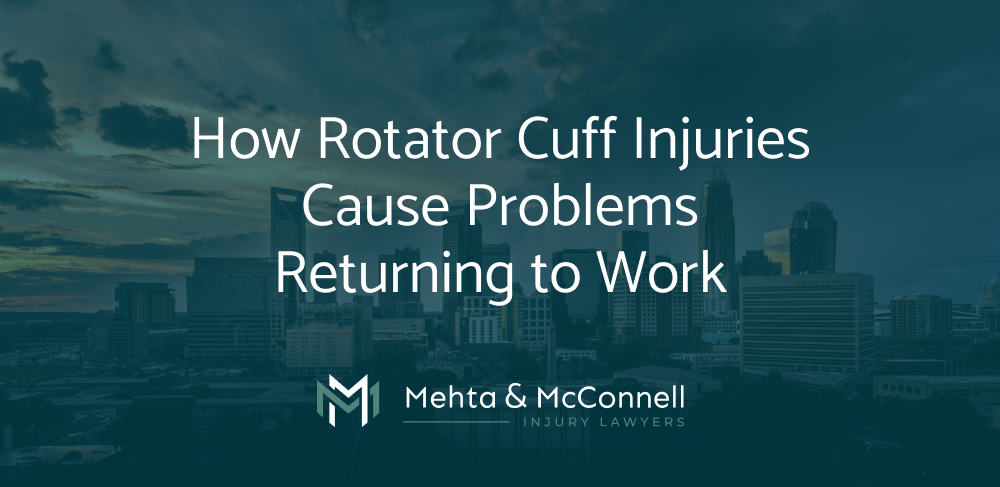
Rotator cuff injuries can be debilitating, especially on the job. These injuries often lead to rotator cuff tear work restrictions and employees taking significant time off to heal, affecting their ability to work or perform their daily tasks efficiently. To make matters worse, employers failing to adhere to legally mandated workers’ comp accommodations and abide by doctors’ restrictions can cause problems for everyone involved.
If you need help addressing a rotator cuff injury or filing a workers’ compensation claim, we can help. At Mehta & McConnell, PLLC, we understand North Carolina’s workers’ compensation laws and can work with your employer to ensure you receive the accommodations you deserve. Let us protect your rights so you can focus on healing.
What is a Rotator Cuff Injury?
In the United States, over 4.5 million people visit medical professionals for rotator cuff tears annually. But just what is a rotator cuff injury?
The rotator cuff is a group of muscles and tendons surrounding the shoulder joint, keeping the head of your upper arm bone joined to the shoulder socket. A working rotator cuff is crucial for a wide range of arm motions.
Chronic overuse or frequent stress over time can trigger rotator cuff injuries ranging from strains and tears to complete ruptures. Common causes include repetitive overhead motions, heavy lifting, and sudden trauma.
What Are Common Rotator Cuff Tear Work Restrictions?
Doctors often impose work restrictions for rotator cuff injuries that include limits on lifting, pushing, pulling, or any overhead activity. Generally, work restrictions for rotator cuff injury depend on the injury’s severity.
For less severe strains, workers might return to light duties with slight modifications. These modifications may include avoiding activities that involve lifting objects heavier than a few pounds or avoiding repetitive shoulder movements.
Your employer may also offer you a temporary job with lighter shoulder usage called a ‘light duty job.’ A light duty job is a modified assignment less physically demanding than your regular duties, for example, your old job, but without any strenuous duties or a desk job. Light duty jobs enable workers with a workers’ compensation case to resume working without worsening their injury.
For workers with more significant injuries, especially muscle tears requiring surgical intervention, restrictions are usually more stringent. Workers in physically demanding jobs, such as construction or manufacturing, may face restrictions preventing them from performing their usual duties altogether.
For example, restrictions can prohibit a worker from doing essential tasks such as lifting materials during construction work or repeatedly reaching overhead on an assembly line.
What Is the Common Shoulder Muscle Tear Recovery Time?
The recovery time for a shoulder muscle tear depends on its severity and the treatment method. Conservative treatments like physical therapy generally lead to quicker recovery. During physical therapy, which can span weeks to months, workers may encounter everything from slight to significant work restrictions. Workplace accommodations that promote healing during this time may also include:
- Ergonomic adjustments like placing monitors, keyboards, and chairs at appropriate heights;
- Postural retraining to improve sitting and standing postures; and
- Work duty reassignments that honor physical restrictions while still allowing an injured employee to work.
Surgical interventions for muscle tears usually require a more extended recovery period. Rotator cuff surgery recovery time off work can last months and may prohibit workers from performing their regular duties. After undergoing shoulder surgery, employees also commonly experience a guided, phased approach to resuming work, including:
- Post-surgery, your doctor typically recommends a complete break from all work activities;
- After the post-surgery period, your doctor may allow you to return to work, but with significant limitations, such as only completing sedentary tasks;
- Finally, your doctor will decide whether to impose permanent restrictions on work activities or clear you to resume your regular duties; and
- Your doctor may also recommend a functional capacity evaluation to assess your ability to resume regular work or to determine ongoing restrictions.
Unfortunately, some shoulder injuries never wholly recover and can periodically cause pain throughout a worker’s life. This type of pain can be significantly challenging, especially in professions that rely heavily on shoulder use.
For example, groundskeepers, who frequently need to lift and hold tools above their heads, may find regular duties increasingly tricky. In these cases, they might need to consider lighter duties, changing jobs, or seeking workers’ compensation benefits.
No matter how long recovery takes, your employer must understand that rushing it can lead to re-injury or chronic issues and potentially leave you without income. Contact us today if you need help working with your employer to ensure they honor your work restrictions, comply with workers’ compensation rules, and offer fair modifications. We’ll stand by through every step of the process.
What Is the Common Strained Rotator Cuff Recovery Time?
While less severe than a complete tear, a strained rotator cuff still requires adequate healing time. The recovery period can range from a few weeks to a couple of months, during which work restrictions may be necessary. However, most people with rotator cuff strains see improvement in pain and function after 6 to 12 weeks of rehabilitation.
Mehta & McConnell, PLLC Your Injury Rights Advocates
At Mehta & McConnell, we help employees suffering from on-the-job rotator cuff injuries understand their rights under North Carolina law. We’re familiar with the rotator cuff injury recovery process, North Carolina workers’ compensation procedures, and reasonable accommodations your employer must provide, ensuring a feasible and safe return-to-work strategy.
As your trusted injury rights law firm experienced in handling workers’ compensation cases, we offer the guidance and advocacy you need to navigate the complex process of returning to work after an injury.
Mehta & McConnell prides itself on professional and cost-effective services and personalized client attention and will fight to ensure you receive the support and compensation you deserve. We have over 30 years of combined legal experience handling injury cases and can help you devise a just plan that compensates you for your hardships. Contact us for a free consultation, and let us help you down the road to recovery.

